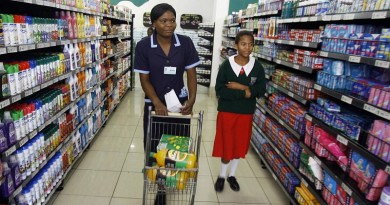Donors to Global Agriculture and Food Security Program announce $300m to end hunger and malnutrition
During the launch of the Global Agriculture and Food Security Program (GAFSP) Replenishment Period 2020-25, hosted by the German Federal Ministry of Economic Cooperation and Development (BMZ), donors increased their contributions to achieve Sustainable Development Goal 2 (SDG2) – a world with zero hunger.
As part of GAFSP’s first replenishment period to raise $1.5 billion over five years, Australia, the Bill and Melinda Gates Foundation, Germany, Norway, and Spain announced over $300 million in new contributions to GAFSP – meeting its yearly replenishment target for 2020. This new funding will allow GAFSP to continue its support for smallholder farmers, businesses, and countries to achieve food security by launching a new Call for Proposals in early 2021 to support COVID-19 response and recovery.
The World Bank Group works with partners to build food systems that can deliver adequate, safe, affordable and nutritious food to people in a sustainable way, both in times of crisis and beyond. The World Bank serves as host, Trustee, and is one of GAFSP’s implementing partners, which include regional and multilateral development banks and the Rome-based agencies.
“GAFSP encourages its partners to push the envelope in our field,” said Martien van Nieuwkoop, Global Director, Agriculture and Food Global Practice, World Bank, “For instance, it was one of the instruments that pushed us at the World Bank to pay more attention to nutrition and the quality of food in our focus on agriculture – something that has been underlined as critical during this pandemic.”
GAFSP’s replenishment comes at a critical moment as progress towards achieving SDG2 by 2030 is at risk. According to new research from the Centre for Development Research (ZEF), Cornell University, the UN Food and Agricultural Organization (FAO), the International Food Policy Research Institute (IFPRI), and the International Institute for Sustainable Development (IISD), donors must spend an additional $14 billion a year on average between now and 2030, roughly double what they currently spend on aid for food security and nutrition, to end hunger sustainably. Rising global hunger and food insecurity, already compounded by climate change, conflict, and economic instability, are further complicated by the COVID-19 pandemic.
Dr. Gerd Müller, German Federal Minister for Economic Cooperation and Development, expressed his strong support for GAFSP’s replenishment, “GAFSP partners are partners against hunger. GAFSP was founded during a crisis and has been successful in crisis. It was the answer to the global financial and economic crisis in 2008 and to rising food prices. In the current COVID-19 crisis, GAFSP has shown again that it can respond.”
GAFSP’s event was part of a larger moment, convened by the German government, to take stock of what has worked and identify good practices in agriculture and food and nutrition security in order to meet the SDGs by 2030. GAFSP partners came together to reinforce the importance of multi-stakeholder partnerships and focus on concrete actions and interventions, including how GAFSP is an effective instrument to respond to current crises. Most recently, in response to COVID-19, GAFSP allocated close to $60 million in additional financing to 16 ongoing public sector and producer organization-led projects in Bangladesh, Bhutan, Cambodia, East Africa, Ethiopia, Haiti, Honduras, Lao PDR, Mali, Rwanda, Senegal, Uganda, Yemen, and Zambia.
“Australia is a long-standing supporter of GAFSP,” said Honorable Alex Hawke, Minister for International Development and the Pacific, Australia “GAFSP has a strong track record in delivering results for smallholder farmers. It can play an important role in addressing hunger in this COVID-19 period and beyond.”
Launched in 2010, GAFSP delivers targeted financing for agricultural investments to strengthen resilient and sustainable agriculture systems in International Development Association (IDA) countries. From farm to fork, GAFSP-financed investments have supported more than 13 million farmers and their families, including more than 5 million women and girls, who now benefit from higher incomes, higher agricultural productivity, and better opportunities for themselves and their communities. An additional $1.5 billion would enable GAFSP to help at least 30 countries build sustainable and resilient food systems, increase yields for at least 10 million farmers, and create more than a million on- and off- farm jobs.
“In Liberia, we have seen firsthand the positive impact that our partnership with GAFSP has had in addressing food and nutrition security,” said Honorable Jeanine Cooper, Minister of Agriculture, Liberia. “Farmers have better access to markets, inputs and new technologies, and agricultural productivity has increased. In the face of climate change and a global pandemic, we must continue to invest in our farmers to build stronger and more resilient communities.”




